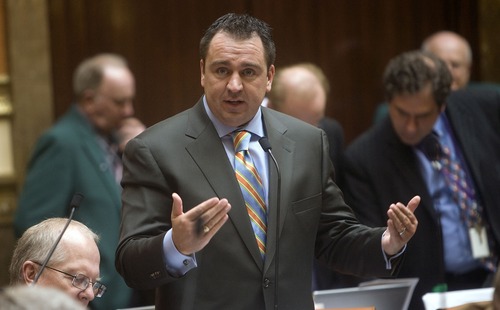This is an archived article that was published on sltrib.com in 2014, and information in the article may be outdated. It is provided only for personal research purposes and may not be reprinted.
A Utah law intended to make it harder for political candidates to collect and spend large amounts of money from undisclosed sources is unconstitutional and harmful to democracy, an attorney with a conservative think tank argued Wednesday.
"The reality is that disclosure [of donors] is probably one of the most harmful forms of regulation to political discourse in the United States and it achieves almost nothing that its proponents claim," said Bill Maurer, director of the Institute for Justice's Washington state office.
Disclosing political donations leaves people open to retribution or harassment — as some supporters of California's Proposition 8 opposing same-sex marriage said they experienced, Maurer argued. It discourages people from participating. And very few people use the information in the disclosures, which can often be misleading itself.
Specifically, he was critical of a law aimed at shining a light on so-called "dark money" — cash funneled through nonprofit entities, then used for political purposes. The nonprofit groups legally do not have to disclose their donors.
Recently, a House committee investigating former Utah Attorney General John Swallow found that payday lenders put hundreds of thousands of dollars into a nonprofit created by Swallow's campaign consultant, Jason Powers.
That nonprofit — the Proper Role of Government Education Association — then moved the money through other entities, ultimately using the funds to stage attacks on Swallow's Republican primary opponent, Sean Reyes, and to defeat former Rep. Brad Daw, who had sponsored legislation payday lenders opposed.
The law, passed last year, was sponsored by House Majority Whip Greg Hughes, R-Draper, in response to Daw's defeat. It requires corporations, including nonprofits, to disclose their donors if they spend more than $750 on election campaigns.
Hughes said the law is aimed at letting the public see who is bankrolling candidates or political campaigns, so they can't hide behind anonymity or, worse, concoct names for their groups to mislead voters.
Maurer said the law is onerous because the reporting threshold is too low, the requirement to disclose donors too rigorous and it raises serious constitutional issues.
"[It] is one of the most expansive and intrusive disclosure laws in the history of this country, not just now, but ever," Maurer said, "and it's almost certainly unconstitutional under applicable 10th Circuit precedent and Supreme Court precedent."
Maurer said the First Amendment guarantees everyone — including corporations — free speech, and that should include not having to abide by government regulation and reporting, just because it relates to an election.
That nondisclosure would apply equally to small donors and billionaire companies or individuals from across the political spectrum like the Koch brothers on the conservative side to George Soros on the liberal end who could pour millions into an election.
"Why would you want to stop it? The First Amendment applies to the Koch brothers as much as it does anyone in this room," Maurer said. Letting government decide who has undue influence on campaigns lets government silence critics. "It's a very, very dangerous idea that we have to stop people from engaging in politics."
Maurer said the institute, which in the past has challenged the constitutionality of state laws it says abridge property rights, free speech and other liberties, does not plan to challenge the disclosure law in court, but it does have "significant constitutional concerns" about the law.
Hughes said he is open to changes that could improve the law, adding that disclosure remains essential.
Twitter: @RobertGehrke



